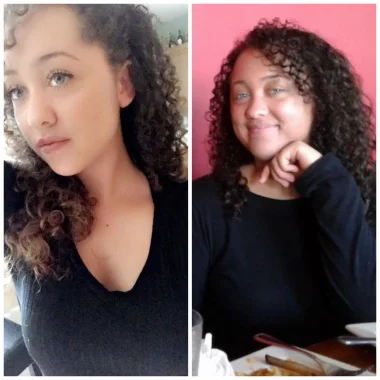Let’s Talk College and Cushing’s Disease
Written by |

College is stressful, but adding a chronic disease to the mix can make taking classes even harder.
I didn’t realize it at the time, but at some point during my interpreter training program for English and American Sign Language, from 2017 to 2019, a pituitary tumor caused me to develop Cushing’s disease. I thought that maybe the program was too challenging for me and my body wasn’t capable of taking on so much stress. I blamed my change in appearance on the stress of the program and the long days of working as an assistant manager at a movie theater.
Nonetheless, I made it through community college without knowing that I was sick.

From left, the beginning of my interpreter training program in 2017, and later, in the middle of my program the following year. (Courtesy of Brandy Moody)
After I graduated from community college in 2019, I took a year off to focus on working and figuring out what the deal was with my weight gain. During this time, my health worsened. I was experiencing many symptoms that would turn out to be interconnected.
I was diagnosed with Cushing’s in October 2020 after eight long months of testing, and had brain surgery that November to remove my pituitary tumor. Although I seem to be recovering well, I still face emotional and cognitive challenges. These can be especially difficult to manage as I continue my college career.
Last year, I started taking an online accelerated bachelor’s program for interpreting English and ASL. I never thought I’d be a good candidate for online schooling. I’ve always performed better academically in the classroom where I can hear and see the teacher explaining things. I find it hard to teach myself the material by reading chapters, clicking through PowerPoints, and waiting 24 hours for an email response.
Still, I’m forcing myself to get it done before I turn 30 in three years. I’m not only attending school full time, but also working as a full-time interpreter.
The following tips are how I’m combating the residual effects of Cushing’s during college. If you’re facing a similar situation, perhaps you may find them helpful.
My biggest tip is to request accommodations from the disability office at school. This can provide some flexibility in turning in assignments and completing tests, which is especially important with active Cushing’s involving flare-ups.
As a Cushing’s patient, I experience panic attacks, and my emotions sometimes get the best of me. When this happens, I take time to separate myself from the task at hand and do something that calms me.
I recently invested in an essential oil diffuser, and I found that aromatherapy helps me to relax. I also take supplemental magnesium to boost my mood. If you’re contemplating the same, be sure to consult your doctor before trying any supplements.
My next tip is easier said than done, but it’s helpful to eliminate sources of negativity and stress in life. Cushing’s can make our bodies especially sensitive to them. Any job or schooling likely involves some degree of stress, but if you need to, ask yourself what else weighs you down. Is it toxic relationships? People who don’t support you? A bad habit? Get rid of them!
Time management is something that everyone can benefit from. We can never recover time once it’s gone, so it’s important to use it wisely. That might mean waking up early to finish assignments or catching up on school work during a lunch break. This is temporary pain for long-term gain.
How we manage cognitive challenges depend on the unique issues we face. Cushing’s patients often struggle with logic, reasoning, and information retention. I’ve found that consistency and visuals help me to learn new information, so I make my notes somewhat artistic and utilize diagrams and colors. If by chance you know sign language, I’d also recommend signing to yourself the information you’re trying to remember.
If you’re pursuing schooling while living with or recovering from Cushing’s disease, please drop a comment below to share your experiences and tips. I would love to hear them!
Note: Cushing’s Disease News is strictly a news and information website about the disease. It does not provide medical advice, diagnosis, or treatment. This content is not intended to be a substitute for professional medical advice, diagnosis, or treatment. Always seek the advice of your physician or other qualified health provider with any questions you may have regarding a medical condition. Never disregard professional medical advice or delay in seeking it because of something you have read on this website. The opinions expressed in this column are not those of Cushing’s Disease News or its parent company, Bionews, and are intended to spark discussion about issues pertaining to Cushing’s.






Zoann Murphy
Hi Brandy, I'm in online graduate school, working towards my Ph.D. in Psychology and managing school and Cushing's and several other chronic illnesses has been like juggling hedgehogs - OUCH! I work with my school's Disability Services office to get extended time accommodations for each course, and occasionally I've had to request a leave of absence while recovering from a hospital stay. I also work closely with each instructor, letting them know when my brain fog is bad and I need an extra day or two beyond the official accommodation to finish a paper. Most of the instructors have been very understanding and supportive, however, I did have one instructor who stuck to the absolute letter of the accommodation and would not provide any additional assistance. I sent a discreetly worded letter to the Dean and the Disability Services office describing the situation and suggesting that the instructor not be given students with disabilities in the future. Don't know what happened after that, but I felt that I was heard and my opinion respected. That would be my takeaway message: you have to be your own advocate! Don't be afraid to speak up for yourself because you often end up supporting others without knowing it.
Brandy Moody
Hi Zoann! Working towards a Ph.D while juggling multiple chronic illnesses? I love to see it! You are a true warrior. I'm so happy that you advocated for yourself and provided feedback about the professor, that can be difficult to do at times. Thank you so much for sharing some insight on what it's like being a student with disabilities :) I wish you the best of luck in your program!